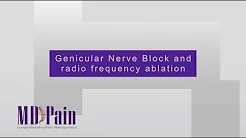Denver Knee Pain Treatment
When knee pain keeps you from doing the activities you love, it puts a damper on your life. The team at MD Pain addresses your knee pain and finds a solution that works. With convenient locations in Denver, our highly-trained and board-certified professionals can finally get back to what you’ve been missing. Whether it’s playing with the grandchildren or the Mile High City’s latest 5K, our pain management specialists will help with your chronic knee pain. If you're ready to get your chronic knee pain diagnosed and treated, call the medical professionals at MD Pain Management today.
Our team understands that the knee is one of the body’s most complex joints, where several ligaments, small fluid-filled sacs, and muscles attach to internal structures that affect movement. That’s why we don’t just offer a quick fix. We take the time to understand your medical history, conduct a physical exam, and use diagnostic imaging studies to develop an appropriate treatment plan tailored to your unique condition.
Common Knee Pain Symptoms
Knee pain is a common problem that can be caused by a wide variety of factors. When you experience knee pain it may be sharp and sudden, or it may be a dull ache that gradually worsens over time. It can also vary in intensity, from mild to severe. There are also a number of different knee pain symptoms, which can include:
-Swelling: This is often one of the first signs of knee joint pain and is usually caused by fluid buildup around the knee joint.
-Redness: If the knee is red and warm to the touch, this could be a sign of inflammation.
-Stiffness: Joint stiffness is common after periods of inactivity, such as after a long car ride or flight. However, if the stiffness persists or gets worse over time, it could be a sign of arthritis or another condition.
-Weakness: If the knee feels weak or unstable, this could be a sign of instability or muscle weakness.
-Popping or clicking: If the knee makes sounds like popping or clicking, this could be due to cartilage damage or other issues.
Knee Pain Causes
Knee pain is a common complaint that can have a variety of underlying causes. In many cases, knee pain is the result of overuse or a knee injury, such as a strain, ligament tear, or cartilage damage. Arthritis is also one of the common causes of knee pain, particularly in older adults. Osteoarthritis, the most common type of arthritis, occurs when the cartilage that cushions the bones wears down over time from repetitive movements. Rheumatoid arthritis, another type of arthritis, is caused by inflammation of the joints and can affect the knee function.
Other potential causes of knee pain include gout, acute injuries, tendinitis, and bursitis. In some cases, knee pain may also be caused by a pinched nerve, compression of the blood vessels, an anterior cruciate ligament (ACL) tear, or other ligament tears from a knee injury. Most cases of knee pain can be treated with rest, ice, over-the-counter medication and other non surgical treatment options. However, if the pain is severe or persistent from a knee injury, you may need to seek medical attention from a doctor or pain specialists for further treatment to get a proper diagnosis of the underlying cause.
Knee Pain Treatments
At MD Pain, we understand the debilitating effects of chronic knee pain. Knee pain can make it difficult to perform even the most basic activities and can lead to a sedentary lifestyle. Our goal as a knee pain specialist is to help our patients find relief from their knee injuries so they can get back to living their lives. We offer a variety of knee treatments to relieve pain, including:
- Joint injections: Steroid injections can help to reduce inflammation and pain in the knee joint.
- Physical therapy: A customized physical therapy program can help to strengthen the muscles around the knee and improve the range of motion.
- Acupuncture: Acupuncture is a proven treatment for chronic pain, and can be very effective for knee pain.
- Chiropractic care: Chiropractic adjustments can help to relieve pressure on the nerves and joints, providing relief from knee pain.
If you are suffering from chronic knee pain, contact MD Pain today to schedule a consultation. We will work with you to create a knee treatment plan that will provide you with the relief you need.
Knee Pain Treatment Near Me: Why Choose MD Pain
Searching for knee pain treatment near me often yields a long list of results. What sets MD Pain apart is our reputation for lasting results, individualized care, and compassionate providers. We’ve built long-standing relationships with patients across all age groups by focusing on what matters most, decreasing pain, restoring mobility, and improving quality of life.
MD Pain is a name trusted throughout Denver and Colorado Springs. We understand how knee pain affects every step you take, so we walk with you through each phase of your healing journey. If knee pain has started to limit your life, let MD Pain help restore your movement and comfort. Our experienced team is ready to find the source of your pain and create a personalized plan to help you feel better, longer.
Knee Pain Q & A
Multiple issues and conditions can cause knee pain. In many cases, injuries, repetitive movements, and arthritis are the underlying causes of knee pain.
Your knee joint consists of bones, cartilage, muscle, ligaments, tendons, and fluid-filled sacs called bursae. Problems can arise with any of these, leading to knee pain that ranges from mild to severe.
At Metro Denver Pain Management, the most common conditions relating to knee pain that patients experience include:
- Anterior cruciate ligament (ACL) tears
- Bone fractures
- Meniscus tears
- Bursitis
- Patellar tendinitis
- Iliotibial (IT) band syndrome
- Arthritis
- Kneecap dislocation
Sometimes problems in the foot or hip can also cause referred knee pain.
Sometimes, knee pain results from overuse or a minor injury and heals with a few days of rest at home. Other times, knee injuries are severe and need medical treatment. If you’re unsure if you need to see a doctor about your knee pain, the Metro Denver Pain Management practice recommends following up with a physician if:
The knee severely swells
You can’t bear weight on the knee
The knee can’t fully extend or flex
- Your knee looks deformed
- You see signs of infection, including redness and/or fever
- Your knee gives out
If your knee pain doesn’t go away after a week or so of a RICE regimen, which includes rest, ice, compression, and elevation, call Metro Denver Pain Management to discuss the issue.
Your doctor determines the best course of treatment for your knee based on the underlying cause and severity of your pain.
In many cases, rest and physical therapy can relieve knee pain. Through therapy, the muscles and supportive tissues in your knee strengthen and stabilize and you can regain your range of motion.
When your inflammation is severe, the practice may recommend corticosteroid or hyaluronic acid injections. Corticosteroids work to reduce inflammation, while hyaluronic acid acts as a lubricant, improving mobility.
Certain conditions, such as progressed osteoarthritis and significant ligament tears, may require surgery.
Yes. We provide a range of non-surgical solutions, including regenerative medicine and targeted injections, to help decrease pain and inflammation caused by arthritis or uric acid crystal buildup.
We start with a physical examination and review of your medical history, followed by diagnostic imaging studies or blood tests if needed. These help us understand the joint’s internal structures and determine the best course of action.


